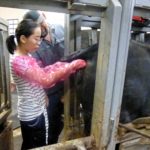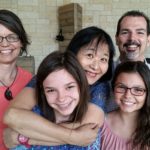States’ 4-H International Exchange brings 23 Japanese youth to Texas
Program helps with greater global awareness, understanding
Writer: Paul Schattenberg, 210-859-5752, [email protected]
Contact: Dr. Darlene Locke, 979-845-1023, [email protected]
COLLEGE STATION – Twenty-three youth and two adult chaperones from Japan recently visited Texas as part of the States’ 4-H International Exchange.
“The youth delegates are staying with Texas families all over the state,” said Dr. Darlene Locke, Texas A&M AgriLife Extension Service youth development specialist with the recreation, park and tourism sciences department at Texas A&M University, College Station. Texas 4-H partners with States’ 4-H International Exchange, along with 19 other state 4-H programs. States’ 4-H is the parent organization and establishes the partnership with cooperating countries.”
She said the States’ 4-H International Exchange program is comprised of AgriLife Extension professionals helping to facilitate cultural immersion experiences for 4-H-aged youth and their adult chaperones.
“Some of the goals of the program are to engage youth in world citizenship, to promote cultural understanding and empathy and to help youth develop a global perspective and a personal sense of their place in it,” she said.
She said the program also helps with self-understanding and provides an opportunity to learn about other cultures, customs and languages.
Locke said the program currently takes place in 19 states and has been conducted in the U.S. since 1972.

“Exchanges occur between the U.S. and 16 different countries,” Locke said. “And Texas 4-H offers four-week homestays in conjunction with specific Japanese programs. While there are other options, Texas 4-H has exchanged with Japan for 30-plus years, so it has become pretty much the standard choice for Japanese youth wanting to visit a foreign county. And the timing coincides with their summer break.”
She said Texas host families for 2018 are located in Bastrop, Bexar, Brazoria, Brown, Cherokee, Denton, Gillespie, Harris, Johnson, Kaufman, Kendall, Medina, Parker, Rusk, Smith, Tarrant, Terry, Van Zandt, Wood and Jim Wells counties.
“4-H membership is not a requirement, but 20 of the 27 families are active in 4-H,” Locke said. “I’m always recruiting host families, and each year I seek to find about 25-30 families to commit to this four-week program.”
One of this year’s host families is the Lochte family of Fredericksburg. This summer, Karen Lochte and her family hosted Kokoro Niisato, a 13-year-old girl from Tochigi Prefecture, Japan.
“We had to take my daughter’s 4-H project cow to the vet to be palpated, and we talked Kokoro into palpating the cow, which I don’t think she’ll want to do more than once in her life,” Lochte said. “We also went grocery shopping together. She was so impressed with the amount and variety of food, she took photos of the grocery aisles. Kokoro has also done a lot of swimming and has done some quilting during her time here.”
Lochte said she and the family also took Niisato camping at Garner State Park and later plan to visit the zoo.
Lochte, who was herself an international foreign youth exchange student to Australia through the 4-H program when she was in high school, said the experience helped her mature.
“I was 17 and went to Melbourne and Tasmania, and for six weeks I stayed with five different families,” she said. “I was traveling with other people I didn’t know and meeting new people all the time, so I learned how to connect with people pretty quickly. The experience taught me how to adapt, talk to people, become more self-reliant and adjust to certain things, such as people driving on the other side of the road.”

Cullen and Sarita Wright and their son Mason, who live in Sandia, hosted Keita Sunaga, a 13-year-old boy from Ibaraki, Japan.
“Over this past weekend, we went to Dallas and took Keita to dinner at the Medieval Times restaurant and went to Six Flags,” said Sarita Wright. “He likes to fish and has enjoyed seeing the horses, cows and show pigs on our property. He also pitched in at a fundraising event we held for an injured Jim Wells County 4-H member. His entire visit has been fun and interesting.”
Wright said though there were a few communications issues, Sunaga spoke some English and he and Mason became friends.
“One of the funnier experiences with Keita was when we went to a local sushi restaurant, but absolutely nobody there spoke Japanese,” she said. “The menu was in English, so it was difficult for Keita to understand what he was ordering.”
The Haschke family of Decatur and another family co-hosted an adult chaperone.

“Last year, we hosted a 13-year-old girl from Japan, but our schedule this year only allowed us to commit to two of the four weeks, so we and another family co-hosted Masami Sato, one of the two adult chaperones,” said Julia Haschke. “It was a great experience. She cooked for us and we really enjoyed learning how to make sticky rice and sushi. Also, my girls and I have been learning some Japanese, and Masami has been helping us with the pronunciation. My daughters, who are now 14 and 11, hope to go to Japan sometime in the future.”
Haschke said there was also an opportunity for cultural exchange.
“There was a festival going on in Japan during Masami’s stay and her husband sent her pictures, which she shared with us,” she said. “And her son was in Texas two years ago for 10 months, so he told her about rodeos. My family took Masami to a youth rodeo and the other family, who are friends of ours, took her to an adult rodeo. We host families also plan to give her a farewell dinner.”
While Texas 4-H members can travel to Japan, Costa Rica, South Korea, Denmark or Norway for a four-week homestay through the exchange program, Locke said none are participating this year.
“We’d like to send more youth to these countries, but it can get expensive, so we’ve not had too many participate in the Outbound Program portion of the exchange,” she said. “Still, it’s a wonderful and meaningful experience for anyone who can participate.”
For more information on States 4-H International Exchange, go to https://www.states4hexchange.org/.


